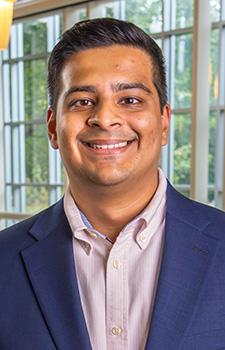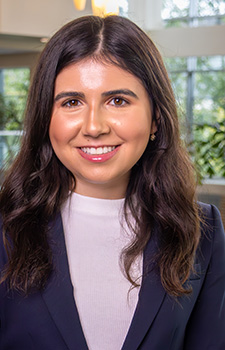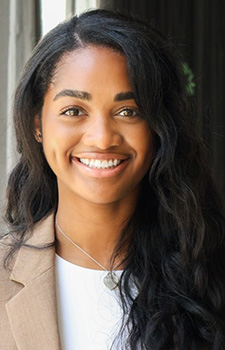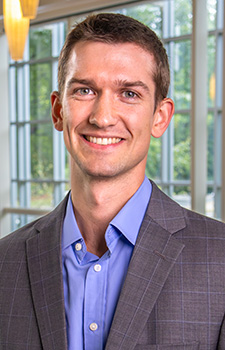Meet the JD Class of 2027
The 250 members of this year's 1L class come from 36 different states and six countries outside the U.S.
Duke Law School welcomed 250 students from 111 undergraduate institutions into the JD Class of 2027 this fall. Selected from nearly 5,400 applicants, the 1Ls hail from 36 different states and six countries outside the U.S. Forty of them are the first members of their family to attend college.
One out of ten members of the class holds a graduate degree, and 71% begin law school with some post-college work experience. And for the seventh year in a row, women make up more than half of Duke Law’s 1L class.
Duke Law School did not collect information from applicants on racial or ethnic identity. Enrolled students self-reported such data to the Law School Admission Council in signing up for services and to the university upon registration. The full class profile can be viewed here.
Four members of the class tell us about their background, what brought them to Durham, and their plans for law school and beyond.
Tanmay Gupta graduated from the University of Chicago, where he majored in political science. After completing his master of public affairs at Brown University, he worked for a federal contractor in Washington, D.C., performing data analyses, reviewing Medicare payment policies, and developing new claims data metrics that could help clients at the U.S. Department of Justice identify potential fraud, waste, and abuse in the Medicare system.

Why did you decide to pursue a law degree, and why did you choose Duke Law School?
Although I was born in India, my family and I lived in Venezuela and Thailand for most of my childhood. In the places I lived, I often witnessed how the lack of strong legal institutions contributed to widespread inequities. Working with attorneys at the DOJ over the last few years also helped me gain an increased appreciation for the impactful work lawyers can do to support institutions that protect vulnerable populations and cemented my interest in attending law school.
From conversations with students and a visit last fall, I quickly realized Duke Law was a place that offered incredible opportunities to pursue both my academic and career goals. Equally importantly, its tight-knit and collaborative community was one I wanted to be a part of and could envision myself thriving in.
How will you use your law degree after you graduate?
After law school, I would like to work at a law firm where I can continue to develop knowledge across many areas of the law. I hope to practice both in the U.S. and eventually in developing regions like Latin America or South Asia, to which I have personal connections. I envision transitioning from a global law firm to serving in a role in which I can use my legal skills to strengthen the rule of law for more equitable outcomes in the communities where I will live.
Are you involved in any student groups or extracurricular activities? What do you do to relax?
I am excited to join Duke’s Law and Technology Society, Immigrant and Refugee Project, and serve as the 1L representative on the Law School’s Curriculum Committee. I am also a member of the South Asian Law Students Association and hope to keep pursuing other interests as they continue to develop over these next three years.
I enjoy basketball and football, listening to podcasts, spending time with friends, watching thrillers, and have started to appreciate cooking as an activity and not just a chore. I have also been hoping to learn the piano, though I realize my 1L year might not be the best time for that!
Tatiana Ojeda grew up in Los Angeles and attended UCLA, where she majored in political science and communication and minored in entrepreneurship. While there, Ojeda interned at a venture capital firm, an international big law firm, and on a mayoral political campaign, and worked as a licensed bail agent and administrative assistant. She says exposure to the political, financial, and legal sectors through those diverse work experiences shaped her desire to pursue a career as a corporate attorney.

Why did you decide to get a law degree, and why did you choose Duke Law School?
As the only daughter of Cuban immigrants living under one roof with my parents, grandparents, and aunt, my upbringing was already far from conventional. Compounded by the fact that my parents own and operate a bail bonds company and are on call 24/7, I spent many hours at police stations or jails while they bailed someone out. Suffice it to say, there was no lack of action or entertainment during my childhood. While some children see their parents’ work as something that starts at nine and ends at five, my parents’ roles as bail agents never stopped, and as a result, the entire family was involved. I obtained my bail license at the age of 18 and began bailing out clients myself to help my parents.
After submitting the bond and paperwork, I sometimes spent hours waiting for the individual’s release so I could guide them through the process and answer their questions. These interactions showed me that being arrested does not necessarily equate to someone being a criminal. This work equipped me with the ability to comfort people in high-pressure situations, helping me navigate the inherent flaws of a cash bail system rooted in inequity. My ambition to practice law has been nurtured partly by my family’s proximity to the legal system and my early exposure to my dad’s conversations with defense attorneys.
Admittedly, my interest in law was also ignited by TV shows such as Law and Order: SVU and Suits. Originally, it felt natural for me to practice criminal law, given my family’s business. However, after I started college, I interned at a venture capital firm in Los Angeles, which kindled a fascination with business and startups. Working toward my goal of becoming an attorney, I also interned at an international law firm. My daily conversations with associates and partners introduced me to areas of law outside of criminal defense, which is how I became interested in corporate transactional work.
When I was applying to law schools, Duke immediately stood out because of its fast-paced yet close-knit learning environment, JD/LLM in Law and Entrepreneurship, and access to esteemed professors. I knew I desired a new environment and city that would challenge me to step out of my comfort zone and broaden my perspective. Despite having visited Duke Law for less than 24 hours, the minute I stepped onto campus, there was no question that I would spend the next three years here. What set Duke apart from other schools was that despite the inherently intense nature of law school, Duke Law students seemed genuinely happy and dedicated to establishing a community. When people say that Duke Law is collegial, they are not joking. Before committing to Duke Law, many current students were willing to speak to me, share their experiences, and answer my questions, which confirmed that I would be a part of an extremely special community at Duke.
How will you use your law degree after you graduate?
My passion for entrepreneurship, start-ups, and business drives me to work as a transactional attorney at an international law firm after graduation. As an attorney, I would like to advocate for two causes that are close to my heart through pro bono work: criminal justice reform and supporting violent crime victims. Also, as a first-generation Latinx professional, I am dedicated to diversifying the legal field and advocating for increased Latinx representation in the legal profession.
Are you involved in any student groups or extracurricular activities? What do you do to relax?
Over the next three years, I am incredibly excited to make Duke Law and Durham my home away from home. Growing up in a traditional Cuban household, I am extremely proud of my Cuban identity. I look forward to joining Latin American Law Students Association (LALSA) and cultivating relationships with other LALSA members. I am also excited about joining the Business Law Society and the Start-Up Ventures Clinic, so I can explore my passions for business law and entrepreneurship and gain invaluable practical training. I am also telling myself I will join the Duke Law Run Club even though I am not a runner, so we shall see if that happens.
It is almost guaranteed that when I am not studying, I can be found at a Pilates or workout class. I am a total foodie, so I enjoy exploring new restaurants or coffee shops and experimenting with recipes. Also, I love to relax by watching F1, professional tennis, or the Real Housewives!
Clarke Shead graduated from Duke University, where she studied psychology, chemistry, and African & African American Studies. Shead explored her strong interest in racial equity in health care as a member of a Bass Connections team focused on the retention of diverse students in STEM and as a research assistant with the Samuel Dubois Cook Center on Social Equity, where she studied the intersection of faith and chronic diseases disparately affecting the Black community in Durham.
After graduating, Shead worked as a healthcare consultant in Washington, D.C. One highlight of that work, she notes, was a pro bono project developing a proposal to address chronic disease exacerbated by poor nutrition among residents of a “food desert” and lobbying the federal government to implement it.

Why did you decide to pursue a law degree, and why did you choose Duke Law School?
I’ve always been certain that I would end up in a service industry that would allow me to be a resource to others with a specific focus on increasing equitable opportunities for the disadvantaged and underrepresented. Although my passion for health equity still burns, my interest in tackling racial inequities spans across industries. I left my pursuit of medicine to find a career that would allow me to explore all these interests and make a more macro change. Following my pro-bono work focused on policy change, I then knew the legal field would be a great fit for the goals I aimed to achieve. Choosing Duke was easy – Duke was home and I knew the intimate community, passionate professors, and involved alumni would aid me in pursuing the diverse experiences and opportunities I hope to have in my career.
How will you use your law degree after you graduate?
I hope to begin my career in a law firm that will help me cultivate my skills as a lawyer hopefully within a practice area focused on start-ups and engaging in pro bono opportunities. I then hope to transition either in-house or in the nonprofit/governmental space to further explore my passion for combatting racial inequities in healthcare and beyond.
Are you involved in any student groups or extracurricular activities? What do you do to relax?
I love going to the Durham Farmer’s Market on Saturday mornings, attending a yoga class or playing tennis with my fellow classmates. I’m looking forward to the weather to cool down to go pumpkin shopping at Perkins Farmers Market. I also enjoy wine nights with my friends, rewatching Scandal, and self-care days. I also just bought a record player so thrift shopping for old-school R&B records has become a new pastime.
I am excited to be a part of the Intellectual Property Law Society, the Black Law Students Association, and the Sports & Entertainment Law Student Association. I am also excited to explore various pro bono opportunities with the Decarceration Project, Innocence Project, Start-up Clinic, and Health Justice Clinic.
Daniel Shepard grew up in an off-grid home in Viola, Wisconsin, farming organic vegetables, growing tree crops, and raising animals. After high school, he was selected for Princeton University’s Novogratz Bridge Year Program, a tuition-free program that allows students to begin their undergraduate studies with a year of community-engaged learning in Dakar, Senegal. He received his bachelor's degree from Princeton in political philosophy and environmental studies and focused his senior thesis on environmental ethics and individual responsibility.
Shepard worked on the water team at Ceres, a nonprofit advocacy organization working to accelerate the transition to a cleaner, more just, and sustainable economy. In that role he helped launch and build the Ceres Valuing Water Finance Initiative, an investor-led effort to engage with corporations and help them reduce their environmental impact.

Why did you decide to pursue a law degree, and why did you choose Duke Law School?
I was attracted to Duke’s exceptional intellectual environment, its deep commitment to innovative interdisciplinary study, and emphasis on serving the common good. In law school, I want to develop skills and explore new ways to organize institutions, democratize power and decision making, craft regulation and legislation to bring about just outcomes, and effectively work toward reshaping institutional systems to ensure the social good is protected. My long-term goal is to work in community with others to equitably address social and environmental concerns. Duke offers a premier Environmental Law and Policy curriculum along with Corporate and Financial Law; it appeared to be an ideal match for advancing my short-term and long-term interests.
I wanted to find a law school environment that is intellectually rich and permits the greatest amount of creative exploration possible. I wanted to be in an academic setting where I can have vibrant discussions and collaborate with students and faculty with a broad range of backgrounds, skills, interests, and identities. Listening to and engaging deeply with ideas, perspectives, and lived experiences that diverge from one’s own is so important in cultivating a real community of learning. I was especially drawn to the values of “The Duke Way,” exemplified by the warm and welcoming atmosphere I experienced from faculty, staff, and students. I chose Duke because it inspired me and I love the trees!
How will you use your law degree after you graduate?
I am driven to make a positive impact on society by reshaping institutions to address global environmental challenges. This commitment has been shaped by years living off-grid on my family’s farm and through my studies in environmental ethics. My work experience at Ceres motivated me to pursue law school as a way to put my values into practice and pursue my goal of addressing structural injustice. I care deeply about addressing sustainability challenges in an equitable way, and I see law school as the next logical step in my journey towards addressing structural injustice.
After law school, I plan to continue advancing corporate sustainability through shareholder engagement, litigation, or regulation. Throughout law school and in my career beyond, I will continue working for the public interest, asking important ethical questions and never taking for granted that the status quo is just. I hope that attending law school will be an important step in helping me be a more effective advocate for a sustainable economy for all.
Are you involved in any student groups or extracurricular activities? What do you do to relax?
Over the next three years, I am eager to get involved in various clinics and student groups, including the Environmental Law & Policy Clinic, the Business Law Society, and pro bono work with the Duke Immigrant and Refugee Project and the Environmental Law Society. To complement my law degree, I am also interested in the possibility of engaging with the Nicholas Institute for Energy, Environment & Sustainability, the Duke Center on Risk and other offerings through the Sanford School of Public Policy and the Nicholas School of the Environment.
My favorite way to relax is spending time with my wife, family, and friends. I love being outside in nature. After lots of time sitting and studying, anything that gets me outside is helpful. It could be something active like taking long walks or hiking, or it could be something more low-key like sitting on my balcony or enjoying the sunset. I’m also an avid juggler. Finally, I’m an animal lover and can’t wait to welcome new cats or puppies into our home.